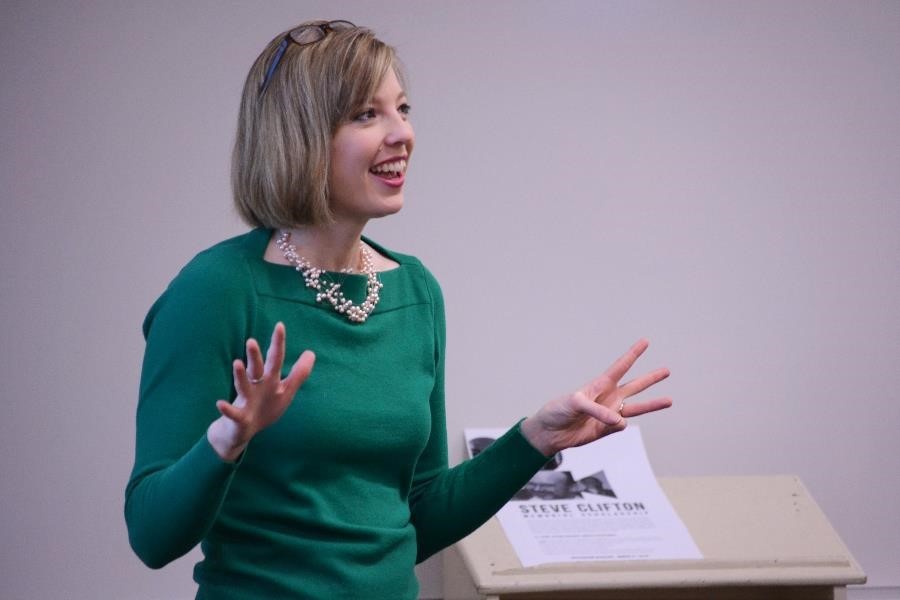Q&A with alumna Kristin Crowley
March 16, 2016
As a part of the Motion Picture Television department’s celebration of their 10 year anniversary, they have brought alumni back who work in the mass communications industry to share their insight. Kristin Crowley, Emmy nominated anchor and reporter at Rockford’s WREX news station crushed the myths of journalism, explained how the time consuming career truly had its benefits and how COD pushed her into this career path. Courier Features Editor Caroline Broderick spoke with Crowley on what it takes to be a journalist.
Courier: What was the most important lesson, if you could choose one, you learned from working as a journalist?
Kristin Crowley: Oh man, I learned a lot. That’s hard. You’re very fortunate to have [equipment] like this, we did not have this when I was going here. That is huge. I think that’s one of the reasons to this day I’m not a very good shooter, it has never been my forte. I think part of that was that I didn’t have hands on with that in school. Everything when I went to college, especially when I went to Columbia, was focused on writing. And that’s great but so much of my job right now is not writing. It is shooting, it is editing and those are both so important because television is so visual that it has to look good. If it doesn’t look good, who’s going to watch it? So I think I really learned a lot on the job about working with the technology we have. Technology everywhere you go is different, but it’s good, it keeps me on my toes.
C: Anything specifically from COD that prepared you for internships and working at news stations?
KC: I think that in general, being at COD, you have a schedule. I took a course with Sandy [Friese] and it was very hyper-focused class and the most focused class I took. I was here to take my gen eds, I wasn’t here to get a degree in journalism, that wasn’t the point. It was to get what I needed to transfer. So, taking that course really helped me figure out this is something I want to do. Especially because it’s very hard to know at 18 years old to know what you want to do for the rest of your life until you’re 65 and I didn’t know. I thought I wanted to be a lawyer. So that helped me and prepared me in terms of my career. Is this something you really want to do? I was like ‘yeah, I can see myself doing this.’
C: Can you explain how you found your internships?
KC: Sure, so my first internship was in radio and I found it because it was the radio station I listened to. It was 103.5 KISS FM and at the time it was the DREX morning show. They just said we’re looking for journalism students to be interns and at that time I knew I wanted to be a journalism student and at that time it was as simple as going online and applying. Then I got that internship which then turned into a full-time job and then from there I was working full time there, going to school then a friend mentioned that ABC 7 was looking for interns. Because I was at my job at KISS FM we had a reporter from ABC 7 who would be a regular on Fridays and I had a relationship with him. I asked him about it and he connected me with a reporter and got me an internship there. It’s funny, I feel like internships are very prominent in news because they are very needed. And the company I work for now, we have a paid internship and always need them, we’re always hiring. We go through probably 3 interns a semester.
C: What do interns do?
KC: internships in Chicago are very different from internships in a place like Rockford. In Chicago, my internship was about watching and observing and in places like Rockford, it’s about doing. You use a camera, they send you to stories, you help reporters go live, you edit, you get to write, you do everything. You don’t do that in Chicago because of unions. There’s a lot more hands on learning in smaller markets. Everything I learned from my job, I learned at the job. In Lafeyette, Indiana where I had no clue what I was doing, I learned a lot on the job.
C: What was the most proud moment you had as a student at COD?
KC: Definitely the internship for sure, when I was in the journalism class and it was available, my first thought was “I’m 19, I’m not going to get this job. First of all, these go to juniors and seniors and I’m competing with so many different people who are way more qualified than I am because I’ve taken one journalism course,” and so when I actually got that [ABC 7] internship, I was just floored because I’m thinking, holy cow, I was working in downtown Chicago on Michigan Avenue on a high rise in a really amazing facility and I knew I wouldn’t have gotten that if it hadn’t been for being at COD, taking a journalism course and having that professor who told me, go for it. So many people think, “I’m never going to make it because somebody else is going to have it, somebody else is going to do this,” and that’s a big lesson I learned from COD: Who cares, go for it. Same thing for the Emmys, “oh we’re never going to win, we’re going up against Chicago.” I got nominated for a best anchor Emmy and from 15 submissions, it was against more than half Chicago anchors and only one got nominated. So that’s a huge lesson I got away from that, stop going in with the mindset “oh someone else is going to do better” and that’s not the case, you just have to go for it.
C: What’s your biggest piece of advice for COD students?
KC: Oh go for it, absolutely. And another thing, whatever you’re going to do, be passionate about it because there are going to be so many things that are going to come up that can sway you to go a different direction, so you better be darn sure that’s what you want to do because if you’re not you’re going to waste your time and a lot of other people’s time too. When I was in Lafeyette and I was making, I think about $22,000 a year and I became friends with the sheriff’s office, “you should come work for us, starting pay for a woman is $50,000 a year” and I was like “oh my god! That’s more than twice what I’m making,” and it was so enticing but I wouldn’t be happy. It wasn’t about a paycheck, I wouldn’t want to do it. Luckily I make more than that now and I’m comfortable and I think I’m very lucky not only because I’m comfortable but because I would not be happier doing anything else than what I love doing and this is what I love doing
C: Were there any differences or hardships being at COD that you overcame?
KC: I for sure fought my parents, I wanted to go away to school. It was kind of getting away from home but I am so grateful I went here. I was one of my only friends who graduated without any student debt and that’s a huge part because of COD because it is so affordable to go to. That’s one thing to get over, yeah I didn’t get to go to Big 10 football games and I didn’t get to live in a dorm, I didn’t get to join a sorority, and it’s so funny because who cares? By the time you’re 30 that stuff does not matter. What matters is your career and the rest of your life and I feel bad for my friends who wanted the “college experience” and are $100,000 in debt and working in retail because they couldn’t get a job and not doing what they’re passionate about and doing what they love. It is so worth it to make the most of your education, to get the best cost you can and turn that and use it for your career because that’s what’s going to matter down the road, not the football game.


















